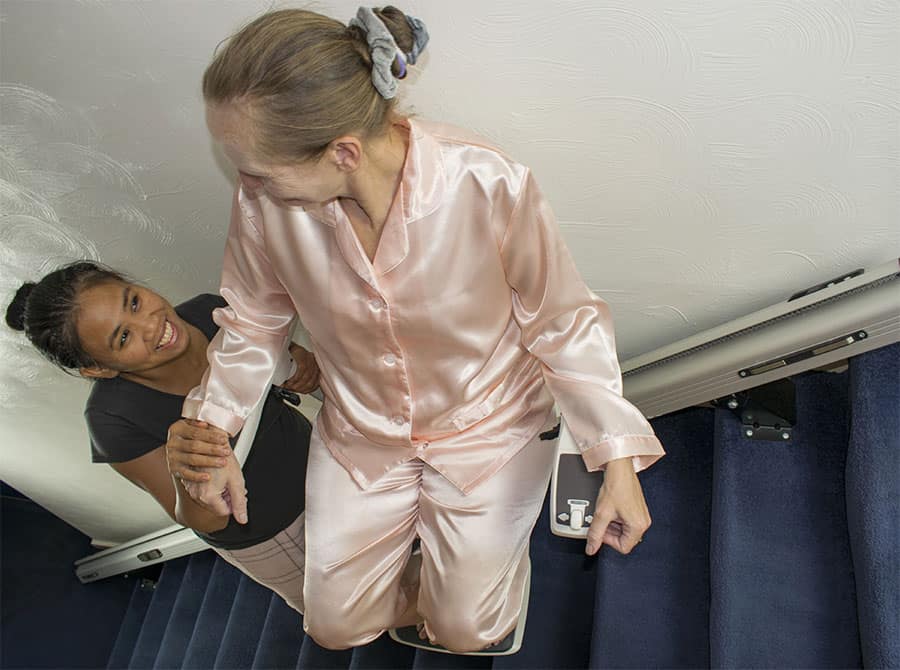Does the stairlift sector need a formal registration system similar to the Gas Safe Register?
Throughout February, stairlifts and safety made headlines, with Dolphin Lifts Midlands raising concerns over a growing private second-hand market and the freedom for anyone, trained or untrained, to fit stairlifts in private residences.
Noting that online marketplaces such as eBay, Facebook Marketplace and Gumtree are fuelling the trend, Dolphin Lifts Midlands’ MD Lee Farrington and General Manager Steve Wilson warned that a tragedy could occur if this element of the market is not addressed.
Also during February, a bereaved daughter called into the question the current system of stairlift provision after her mother suffered a fatal fall at home which involved a stairlift. With safety being the hot topic of discussion, THIIS asked five stairlift experts whether a formal registration system, similar to that in the gas sector, is required in the stairlift market…
Amy Hadlow, Business Manager of Higher Elevation

“There are NVQ qualifications available for the installation, servicing and repair of stairlifts, however, these are not compulsory across the industry. There is a lack of stairlift knowledge among consumers and with stairlifts often being referred to as ‘white goods’, it leaves a vulnerable gap for non-competent persons to take up DIY removals, installations or repairs of stairlifts as a side hobby.
“A recognisable stairlift accreditation like the Gas Safe Register for companies or people in the sector would increase consumer awareness and confidence, as well as safety. Importantly, it would need to enforce high-quality working standards through an exam and/or regular site audits, rather than a money-led scheme. There would need to be a strong presence around the importance of complying to and maintaining the accreditation to remain on the register.
“Stannah offer something very similar for their dealers, the Stannah Certificate of Excellence: dealers have to send every employee on the course to obtain their qualification and companies are audited annually. Those who fail either lose the chance to sell Stannah’s lifts.”
Gareth Watkinson, Managing Director of Dolphin Mobility Yorkshire & Cumbria

“However, a national level of engineer registration similar to “Gas Safe” maybe a little over the top for what the industry needs. While a badly installed stairlift may pose a hazard, it is nothing in the same danger league as a faulty gas appliance.
“I also think a Gas Safe style accreditation would advantage and potentially be open to misuse by larger companies, leaving the smaller independent organisations behind and in the cold.
“There is already an NVQ for stairlift engineers to get accredited to. I feel it is the retailer’s and manufacturers’ responsibility in the industry to push through NVQ compliance and to instil safe working guidelines.”
Nick Mellor, Managing Director of The Lift and Escalator Industry Association (LEIA)

“Without this legislation currently, a focus for us is on ensuring that we drive up the standards of our own members installing and maintaining stairlifts. For example, our members have all been certified to ISO 9001, OHSAS 18001 / ISO 45001, signed up to our Safety Charter and Competency Plan which commits them to enrol their new starters on suitable NVQs.
“In the absence of formal regulations, we also set up a Personal Lifting Group (PLG) whose members have made a commitment to work to a code of practice in this field.
“The installation and testing of new stairlifts are covered by the Supply of Machinery (Safety) Regulations and standards such as BS EN 81-40. Whilst you cannot avoid stairlifts being removed and potentially used elsewhere, good contractors should always make essential safety checks of the equipment and test the reinstalled stairlift in the same way that a new unit would be tested.”
Paul Stockdill, Sales & Marketing Director of Handicare
“Stairlifts should always be installed by manufacturer trained engineers. This applies to new and reconditioned stairlifts to ensure they’re fit for purpose, as well as safely and reliably installed.
“Handicare provides free training for all its dealer partners, as well as our own engineers, to ensure they’re fully aware of the latest modifications and improvements to our stairlifts.
“When we receive enquiries from the public, we provide information about what they should consider when buying a stairlift, including their individual mobility needs as well as their home layout. This includes a guide to buying reconditioned stairlifts, so they can make an informed decision that isn’t just about the price. As responsible retailers we should all make sure consumers are aware of the risks of buying second-hand stairlifts which haven’t been properly refurbished, or which aren’t being fitted by trained engineers.
“An accreditation system may help consumers understand the importance of buying stairlifts which are fit for purpose and professionally installed, but the responsibility is all of ours, to ensure people are making the right buying decision for the right reasons.”
Alastair Gibbs, Managing Director of TPG DisableAids

This cost would inevitably be borne by the customers that complied and therefore it would make the acquisition of a stairlift too expensive for some.
I believe self-regulation would be far more acceptable by the promotion of the BHTA Code of Practice, which in turn needs to get more teeth to deal with those that blatantly ignore the rules as set and endorsed by CTSI – this control should extend to monitoring non-member companies.
It would be almost impossible to stop the trade in used stairlifts being sold by private individuals, but that is driven by demand. If the trade can keep the products affordable then customers are more likely to use a reputable installer.”
https://thiis.co.uk/does-the-stairlift-sector-need-an-formal-registration-system-similar-to-the-gas-safe-register/https://thiis.co.uk/wp-content/uploads/2020/03/Stailift-trade-thought-March-issue.jpghttps://thiis.co.uk/wp-content/uploads/2020/03/Stailift-trade-thought-March-issue-150x150.jpgAnalysis & InsightsNewsroomRetailer NewsSupplier NewsTrade NewsTrade ThoughtsAmy Hadlow,Dolphin Lifts (midlands),Dolphin Mobility Yorkshire & Cumbria,Gareth Watkinson,Gas Safe Register,Handicare,Higher Elevation,LEIA,Stairlifts,The Lift and Escalator Industry Association,TPG DisableAidsThroughout February, stairlifts and safety made headlines, with Dolphin Lifts Midlands raising concerns over a growing private second-hand market and the freedom for anyone, trained or untrained, to fit stairlifts in private residences. Noting that online marketplaces such as eBay, Facebook Marketplace and Gumtree are fuelling the trend, Dolphin Lifts...Calvin BarnettCalvin Barnettcalvin.barnett@bhta.comAuthorTHIIS Magazine



